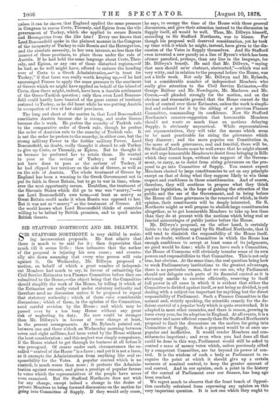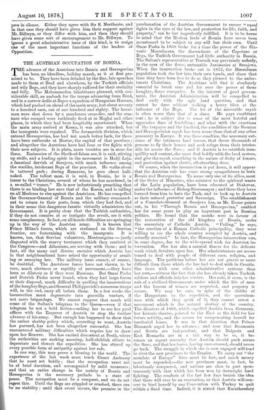SM STAFFORD NORTHCOTE AND MR. DILLWYN.
SlB STAFFORD NORTHCOTE is very skilful in resist- ing inconvenient proposals. He first admits that there is much to be said for it ; then depreciates that much till it seems little ; then intimates that the author of the proposal is injuring his own cause ; and eventu- ally sits down assuming that every wise person will vote against it. On Wednesday, Mr. Dillwyn proposed a motion, on behalf of which a great number of independ- ent Members had much to say, in favour of submitting the Civil Service Estimates to a Finance Committee before they are submitted to the House,—the object being that the Committee should simplify the work of the House, by telling it which of the Estimates are really voted under statutory authority and therefore need no discussion unless it be proposed to repeal that statutory authority ; which of them raise considerable discussions ; which of them, in the opinion of the Committee, need careful revision by the House ; and which may be passed over by a too busy House without any great risk of neglecting its duty. No case could be stronger than Mr. Dillwyn's in favour of some change at least, in the present arrangements. As Mr. Rylands pointed out, between one and three o'clock on Wednesday morning between seven and eight millions, had been voted by the House without the least consideration ; and this neglect was simply compulsory, if the House wished to get through its business at all before it was prorogued. Of course under such circumstances the so- called "control of the House "is a farce ; and yet it is not a farce, as it exempts the Administration from anything like real re- sponsibility for the Votes. A popular control which is no control, is much worse than none ; it protects the Adminis- tration against censure, and gives a prestige of popular favour to votes which the representatives of the people have never even examined. But Sir Stafford Northcote does not wish for any change, except indeed a change in the desire of private Members to bring forward discussions on the motion for going into Committee of Supply. If they would only cease, he says, to occupy the time of the House with these genera/ discussions, and give their attention instead to the discussion is Supply itself, all would be well. Thus, Mr. Dillwyn himself, according to Sir Stafford Northcote, was to blame. For though his proposal well deserved consideration, yet he took up time with it which he might, instead, have given to the dis- cussion of the Votes in Supply themselves. And Sir Stafford even invented a new parody on a line of Byron's which has been oftener parodied, perhaps, than any line in the language, for Mr. Dillwyn's benefit. He said that Mr. Dillwyn, "saying that men should ne'er obstruct, obstructed,"—which was not very witty, and in relation to the proposal before the House, was not a little weak. Not only Mr. Dillwyn and Mr. Rylands, but a considerable number of independent Members who. really give attention to the Civil Service Estimates,—Sir George Balfour and Mr. Newdegate, Mr. Maclaren and Mr. Cowen,—all pleaded strongly for the motion, and on the and reasonable ground that the House cannot do the work of control over these Estimates, unless the work is simpli- fied and reduced for it by the sifting of a previous Finance Committee, commanding its confidence. Now Sir Stafford Northcote's counter-suggestion that honourable Members should not waste so much time on motions delaying Supply, is obviously unpractical. While representatives are representatives, they will take the means which seem to be most practicable for airing the grievances which they discover ; and the more popular our Constitution is,. the more of such grievances, real and fanciful, there will be. Sir Stafford Northcote must be well aware that he might almost as well urge honourable Members to desist from bringing in Bills. which they cannot hope, without the support of the Govern- ment, to carry, as to desist from airing grievances on the pro- posal to go into Committee of Supply. You cannot expect Members elected by large constituencies to act on any principle- except on that of doing what they suppose likely to win them respect and confidence in those constituencies. And of course,. therefore, they will continue to propose what they think popular legislation, in the hope of gaining the attention of the public and the ear of the Government, and to bring before the House all those grievances in the removal of which, in their opinion, their constituents will be deeply interested. Sir S. Northcote might as well propose to abolish large constituencies altogether, as to get honourable Members to take up less time than they do at present with the motions which bring real or fancied miscarriages of public justice before the House.
Mr. Dillwyn's proposal, on the other hand, is certainly liable to the objection urged by Sir Stafford Northcote, that it will tend to diminish the responsibility of the House itself. And no doubt, without a Committee in which the House has enough confidence to accept at least some of its judgments, no good would be done ; while if you have such a Committee, the House of Commons will obviously transfer some of its own powers and responsibilities to that Committee. This is not only true, but obvious. At the same time, the real question being how to work Parliamentary institutions to the greatest advantage, there is no particular reason, that we can see, why Parliament should not delegate such parts of its financial control as it is obviously unable to exercise efficiently, reserving to itself full power in all cases in which it is evident that either the Committee is divided against itself, or not being so divided, is yet dealing with a subject too important for anything but the direct responsibility of Parliament. Such a Finance Committee is the natural and, strictly speaking, the scientific remedy for the de- ficient control of a popular body which is quite overworked. It is adopted in most other countries, and there is reason, growing in force every year, for its adoption in England. At all events, it is a fareasier and more efficient remedy than Sir Stafford Northcote's proposal to limit the discussions on the motion for going into Committee of Supply. Such a proposal would be at once un- popular and ineffective. It would render Members and con- stituencies impatient ; and even when you had done all that could be done in this way, Parliament would still be asked to control a mass of money votes which, unless previously sifted by a competent Committee, are far beyond its power of con- trol. It is the wisdom of such a body as Parliament to re- cognise the point at which it should give up a certain measure of nominal control, to keep the greater amount of real control. And in our opinion, such a point in the history of the control of Parliament over our finance, has long ago- been reached.
We regret much to observe that the front bench of Opposi- tion carefully refrained from expressing any opinion on this very important question. It is not one which they ought to pass in silence. Either they agree with Sir S. Northcote, and in that case they should have given him their support against Mr. Dillwyn, or they differ with him, and then they should have given some sort of encouragement to Mr. Dillwyn. To ignore a great administrative issue of this kind, is to resign one of the most important functions of the leaders of Opposition.































 Previous page
Previous page